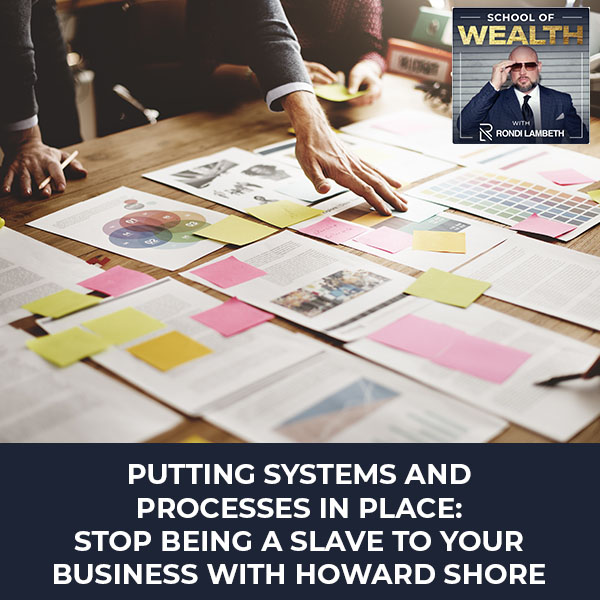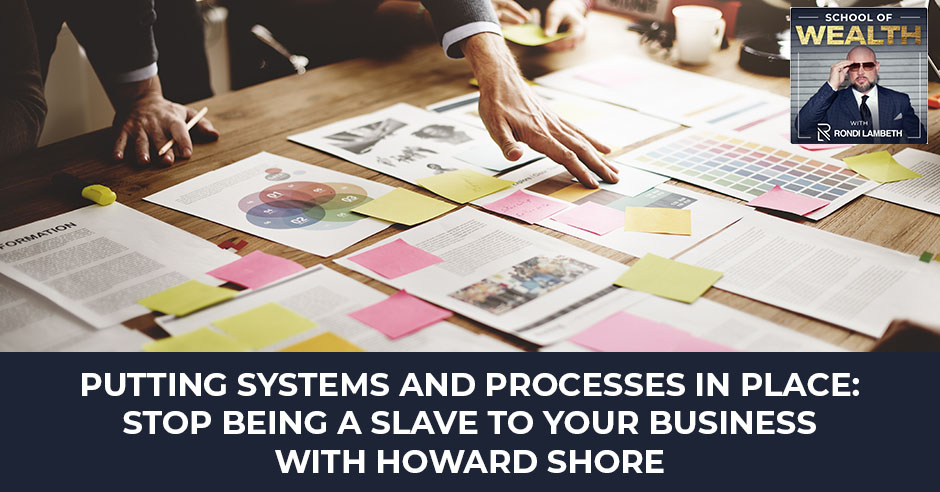
Entrepreneurs, by default, are busy people. With many things requiring their attention and guidance, you would actually think they’ve covered many things. However, looking back in time, they realize that they’ve actually implemented very little, even the ones they deem to be excellent advice. This was the reason Howard Shore wrote his book, The Leader Launchpad. Howard took the concepts from over 50 business books and provided a system to help entrepreneurs avoid being a slave to their business. Howard is a growth expert and master business accelerator. Today, he joins Rondi Lambeth to talk about why entrepreneurs need to put up processes and systems in place in order to work on their business and not in it.
—
Listen to the podcast here
Watch the episode here:
Putting Systems And Processes In Place: Stop Being A Slave To Your Business With Howard Shore
I’m excited for the guest I have. My guest is the Founder and CEO of Activate Group Inc., bestselling author, serial entrepreneur and specializes in liberating C-Suite teams from barriers holding them back personally and professionally. He owned several companies, he sold several of his companies, and he’s worked with numerous top Fortune 500 companies, training performance, enhancing organizations like Scaling Up and Gazelles, which you’re going to have to explain what that is because honestly, I’ve never heard of that.
He’s become a very sought-after business mentor, executive coach and keynote speaker. I’ve seen him speak ten times over the years and I enjoyed his presentations. His clients that he works with and helps either have family-owned businesses, multinational companies, public companies, private companies, ranging anywhere from $1 million in sales to over $1 billion in annual revenue. He does expert keynote speeches on employer empowerment, cashflow enhancement, human capital, entrepreneur freedom, and business growth. With many years of a track record of success, it’s my pleasure to have Howard Shore on the show. Thanks, Howard, for taking the time with us.
Rondi, I’m so happy to be here with you.
You are in Sunny, Florida, aren’t you?
I am in Miami, Florida.
Tell me how you get started with business. You’ve been doing it for many years. What’s your background?
I grew up in an entrepreneurial family. I was severe ADHD, I have to cope out of glasses. I also have sleep apnea, so I used to fall asleep in class uncontrollably as a kid. As you can imagine, I wasn’t the best student in the world. Later in life, I figured out how to study, but up through high school, I was not winning any awards or getting on any honor roles. I even mentioned to my dad I was going to go to college. My dad was like, “We don’t do that in our family. We own businesses.” I want to buy my first business when I was eighteen. It’s amazing to have parents who are like, “Don’t go to school. Do this.” I eventually went to school but it was because of that push that I’m like, “I’m an entrepreneur, I’m going to do this.” That’s how I wound up going in.
What did you buy at eighteen years old?
I grew up in the printing industry. Back then, there was a segment of the industry called typesetting. It doesn’t exist anymore. I am in the typesetting and graphic design company, which we grew 100% every quarter until I realized the industry was going to die. I didn’t know about looking at industries or the future when I got into my first business, I’m like, “I need to work and go make some money. I can make money anywhere.” I got in the middle of that and then I realized, because of the changes in technology, I was going to be dead in five years so I decided to sell.
That was your first business that you sold?
Yes, when I was 21.
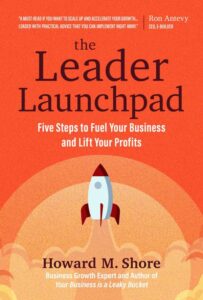
The Leader Launchpad: Five Steps to Fuel Your Business and Lift Your Profits
How many businesses have you had so far?
I’ve invested in nine total businesses.
How many of those have failed?
We’ve got to define failure.
Failed as in bankruptcy, quit, closed their doors or shut down because they don’t want to file bankruptcy.
I’ve been fortunate where none of them have failed but I have had failures. To me, if I invest in a company and I exit, and all I got was what I put into it, I failed. I’ve had that happen. I’ve had other ones that I got into them and I realized I didn’t love the business, we didn’t have the right team, and I didn’t have my gumption behind it, then I exited those. I think all of them are still active.
The business that you have now, do you have one now?
I’ve invested in several but in terms of my being active, as of 2020, I’ve exited the software company I was in. Activate Group has got my sole attention so that I can grow this property.
Tell me about the Activate Group.
Even though I didn’t have on paper failures, if you go all the way back to the first business, I cringe when I realized how horrible a leader I was back then, and I didn’t know what I didn’t know. Through my course of time, I realized that there had to be a better way of leading businesses because the only reason I was successful is I work three times harder than everybody else. I didn’t like that formula. After going through that and I’ve done everything from $6 billion to $20 billion company at the executive levels in boardrooms, I looked around and I’m like, “This can’t be the best way to run companies.”
That got me passionate about how do I become one of those guys and how do I help other people become one of those guys that works at third and gets five times the return. That became my mission in life. We’re liberating the ones that I want because there are a lot of CEOs and they love being workaholics. If you found them free time, they find another business to own and they’d fill it up, but for the ones that do want to liberate themselves so the things run by themselves, continue to grow, and they could cashflow things, we help them figure that out.
I was literally thinking about that. I try to meditate and visualize before I go to sleep. I try to do it right when I wake up. I’ll hit the snooze button, and I don’t hit the snooze button on my phone to snooze. I do it to where if I fall asleep when I’m visualizing, it wakes me up seven minutes later. I was on a call and the guy was talking. He’s in his 30s and they were asking me like, “What balance do you have and your family time?” It was creating a proper relationship with your family.
He’s like, “I don’t have any hobbies. I workout and I work. I don’t go on vacation. I don’t do this.” I was thinking about that and he was coaching us on that’s what we should be doing as entrepreneurs. I was thinking, “That’s what I used to do.” In my 20s and 30s, I work seven days a week, sometimes 14 to 16 hours a day. I remember in 2011 in San Diego that I would get up in the morning, get my coffee, drink my coffee, take a shower, and go sit at my desk. My wife at that time would bring me breakfast, lunch and dinner.
I would get up and then go to bed. I would sit at that desk for sixteen sometimes longer hours a day, seven days a week. As Brian was talking about this, I’m like, “I used to do that. I don’t want to do that anymore.” I see that as a failure in your business that if it requires that you have to work three times longer than everybody else. I think most businesses fail, even if they don’t go out of business or shut down. I remember you were on the Chamber of Commerce call that we had in April 2020 with Trey Taylor.
Tell me about that one.
The Chamber of Commerce said that 47% of all businesses would fail and never reopened if they went more than 30 days being shut down, and then 88% of all businesses would completely go out of business if they went twelve weeks or longer with no revenue coming in. It was astronomical stat but if you’re thinking like, “I’ve never failed in my business.” If your business is not profitable and growing without you being involved with it, I don’t think that’s a successful business. In my mind, it’s not. I don’t think it requires us to be involved every day. If I’m right, that’s one of the things that you do and activate. You teach the CEOs and other C-level executives how to work on the business and not necessarily in it. Is that correct?
That is spot on. To be transparent with everybody, I’m even doing this in Activate Group for myself. I used to handle seventeen clients which was insane. I run around all over the country. I never handle more than five. My job has shifted to the point where I’m going to be a thought leader and let everybody else go run around like maniacs and I’ll make money off of them. That’s the goal. There were a couple of things that you were talking about that resonated.
There are some other stats for everybody reading. We turned down about 75% of the businesses that we meet because they’re not businesses. It’s just somebody created a job for themselves. Even the salary that they take out sucks. These people have been working their bones for 20 to 30 years. I’m like, “I can’t help you. If that’s all you were able to do in 20 to 30 years, we’re not likely going to be successful. Let me save ourselves from this trouble.” People look successful outside but they’re making very little money. I can’t tell you how many CEOs have even big businesses, and they’re always robbing Peter to pay Paul just to cover their expenses. Meanwhile, they have what appear to be big businesses.
I have five different companies and one of the companies I started in March 2020 right before the shutdown. I’m now up to 88 referral partners or revenue partners that we’ve hired. One thing I love about that business is the overhead is $5,000 a year and you can make millions of dollars a year. This is my very first year in it and I make $350,000 to $400,000. All of my overhead is about $5,000, maybe $6,000.
I see that when I meet with people whether it’s business credit coaching, tax planning or retirement planning, we sit down with these businesses and we look at their tax returns. It’s millions of dollars of gross and $100,000 of profit, if profitable. They’re on $8,000 a month salary, they got tens of millions of dollars coming in, and there’s so much overhead. It’s sad that they work that hard. What’s surprising is how many of them don’t read books, don’t listen to podcasts, and don’t watch YouTube channels that teach people entrepreneurial skills. Some of my success comes from I’m an avid reader. I wasn’t before, but I read every single day. I read ten pages, no matter what, every single day. If you do that, it’s 3,600 pages a year, which you can do about twelve books a year. Speaking of books, I know you’ve written some which is why I wanted to segue into that. Tell me about the book that you wrote.
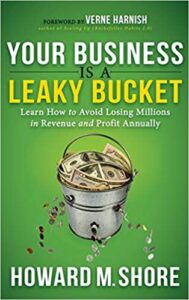
Your Business is a Leaky Bucket: Learn How to Avoid Losing Millions in Revenue and Profit Annually
The Leader Launchpad got written because I was doing what you do. I finish a book every other week and I was doing this forever. I started realizing when I went back in time how little I’ve implemented. I started looking at all the other leaders that read a lot of the same books I did and they had not implemented what they at the time said, “This is good advice. You got to read this book,” and they didn’t do anything with it. What if I were able to take the concepts from over 50 business books, provide a system, and lay it out so you just have to read one book? Get your MBA that you need for the business, and make it practical so you can implement one chapter at a time or several chapters, just work on strategy or execution. Take all of those books, consolidate the cliff notes that you need of wisdom, and then get you running because a lot of people aren’t like us or they’re not going to do it. How could I simplify it for them? That’s The Leader Launchpad. You can get it on Amazon.
I only read one book a month because I focus on the ten pages, I highlight them, I have little stickies that I put in them, and I focus on implementing those ten pages that day. I used to do that thing where I’d read a book in 1 or 2 days. I wouldn’t implement any of it because it’s overload. I know some people do that. They say the average CEO reads a book a week. To your point, if you read 50 books a year and not implement it, what good is it? I’m going to get your book, The Leader Launchpad, you can get that on Amazon by Howard Shore. I look forward to getting that. You have the chapter set up as an implementation chapter.
Each chapter is a concept you need to implement.
The book that I saw that you wrote was Leaky Buckets.
Your Business Is A Leaky Bucket, we need to talk a little bit about that one because it plays into the audience. One of the things that drove me nuts, as I mentioned, here I am in $20 billion companies, $5 billion companies, I’m sitting around the room, and I’m watching money disappear everywhere. We could have made so much more money in those companies I was in, but it was bad leadership that was causing money to disappear. There are some reasons why that happens. First of all, I am a CPA. One of the things I hated about accounting was debits and credits could balance, and then you go bankrupt.
The other thing that most people don’t realize is the only numbers in your financial statements that aren’t estimates is cash and debt. Everything else is a freaking estimate. The other problem with financials that most people don’t realize is it only captures transactions. What I have found over all these years was many times, there’s a lot more money that’s not getting into the financial statement than what’s getting in there. I refer to them as the leaks. For example, you don’t have a line item in your financial statements that says, “I hired a dumbass.” You don’t have a line item in your financial statements that says, “Because I didn’t figure out how to compete in the market, it’s costing me 2 to 3 times more than it should acquire customers.”
There’s no line item for that. You have the expenses that you spent it. It doesn’t show you what you wasted. We’ve never gone into a business where when they’re get done, they just dive to a calculator that goes along with it. There’s always at least $1 million on the bottom line. Many times, leaders struggle because the numbers that wind up on the bottom line that they would have in cash is sometimes ten times. I’ll never forget I worked with a $250 million company. Whenever you go to a business and they’re quoting your EBITDA, that means they don’t make money so they had to come up with EBITDA, Earnings Before Interest, Taxes, Depreciation and Amortization.
They’re trying to get closer to cash and they’re trying to ignore the fact that they have all this depreciation of all the investments that they made in assets, equipment, facilities, and all of that. The reality is they did and they’re losing money. This company was almost break-even. We got the team together and one day, we took them through the concepts of this book and a quick calculator. One idea was we’re $25 million of profit annually by getting them to stop failing to implement a process.
Most businesses don’t have a process and system. They truly are just a job. It’s a working job. The second book is called what?
Your Business Is A Leaky Bucket, and 2.0 came out. I still don’t have it in softcover but it was time to update it and be relevant for the times, and make sure the calculators in there. That one is out as well.
Have you ever read Profit First?
I have.
It’s a great book. That’s something I recommend all the time on the show. Not to steal away from you, but if they read your books, they can implement that in there because I was one of those guys that I had so much money coming in, I’m not saying that in an arrogant way. I’m saying it because I was an idiot for doing this. I had so much cash that if someone said, “This is going to cost $100,000.” I’d be like, “Here’s $100,000.”
After reading that, I started implementing some stuff. Over the last year, money was tight with my divorce and buying out my partner. I purchased via lease $188,000 worth of equipment like copy machines, folders, inserters, stamp machines, office stuff. When I got that bid, that little voice said, “You need to offer him less.” How much profit do you think was in that $188,000 total for everything? What do you think I can offer them and still get all the equipment like copy machines, scanners, printers, and some other high-tech machines?
A lot of that stuff has 50% to 75% margins built in because they’re selling at a market value.
The bid was $188,000 and I got all of it for $95,000.
Yes, because they still made 25%.
Back to your book, Your Business Leaky Bucket. How many times have I done that in my life now? We’re going every year, I take my board members which happened to be some of my family members. We go somewhere every year, we do our annual meetings, and we work for 4 or 5 days. We chartered a private plane to go from the bottom of Costa Rica to the top of Costa Rica, which was going to be a ten-hour drive. I chartered this plane for all of us, and they immediately come out there for $4,000 or something.
I said, “What can you do better?” We ended up getting it for $3,000. It’s the same plane, same pilot, same fuel, it’s just that they had an extra $1,000 profit in there. I like the idea of your book with pointing out ways that you can save money, and then ways that you’re losing money. We had a phone system that we implemented. We lost $300,000 on it and we never activated the phone system. I don’t even know how much we lost in other stuff. I’m excited to get your books and read them.
There are two things to build off of that and you’ll love these stories then. The company that I was giving you as an example earlier was emergency rooms. I outsource to them to run their emergency rooms. As you know in the healthcare industry, it’s all about checking the right boxes so that you get maximum return on investment from the insurance companies. That’s $25 million because they were not checking one box, that they earned across all their hospitals every single day. I’m telling you, the CEO was so giddy in their daily huddle every day. They talked about, “Did you check the box?”

Systems And Processes: Many times leaders struggle because the numbers that wind up on the bottom line that they would have in cash is sometimes ten times.
It’s that $25 million box, and then they found there were other boxes. They were consistently missing because the insurance companies kept changing it. Many times, people think it’s a negotiation. Sometimes, you won’t get paid enough. We do a lot of work in the restoration industry. It’s almost like a tax return. Five people do the same estimate for a job, you’ll get five majorly different answers. In most companies we go into, they have 5% to 10% more profit margin. They would already get paid for if they knew to check the right boxes.
That all comes back down to your operating system. I know that’s something that you have. Tell me another story. Do you have a success story if that wasn’t it? Give me something unbelievable success story. I want you to brag on yourself a little bit, Howard, because I know you don’t normally do that.
There are two different types of successes. One of my favorite ones was this guy, Floyd. We worked together for about five years. When I first met him, he was this young guy. He started a business and it was doing well. To his own chagrin, because he had as much profit margin as you did, he would spend the money on stupid stuff. What we did with him, not only did we continue to double every couple of years, but his exit was he still owns the business. He still sits on the board but he doesn’t even work in his business anymore.
He spends about a couple of hours a quarter being mentors to the leadership team. We grew up and built, and he spends the rest of his time traveling. Working, helping, and influencing government was important to him. That’s an awesome success. You’ve got a guy, 35 years old, he’s spending millions of dollars of his business every year, and he doesn’t have to work. When I first met him, he was working a ton. He was a slave to the business and no one could do anything without him. I thought that was a great success.
Some of the other ones I’m thinking about was Russ at Titan Restoration in Phoenix. It took him twenty years to get to $7 million of revenue and that’s respectable. While he was doing well for his industry, he’s had plateaued and he was frustrated. We’ve all been there. “How did it take me this long to get to $7 million?” is what he kept telling himself when he knew it could be a lot more. Over three years, we tripled that number. He set a goal to double it and we tripled it. More importantly, the average company in this industry makes 5% net. He made 25% net, so he was happy.
Give us some advice for the new entrepreneurs or existing entrepreneurs. What can they do to make a difference in their business?
It’s interesting because we’re all in the same storm, but just different boats. You’ve got some companies that are restarting, rebuilding, resuming, regressing, and booming so they’re exploding. I’m going to give you a different answer. If you’re regressing, you have a strategy problem. Many of the companies that are regressing were regressing pre-COVID. What you need to figure out is, what are you going to offer to the market that is unique and valuable to a customer set. When you’re struggling to grow, when you’re regressing, what the market is telling you is, “You may be good at what you do but I don’t care. You look like everybody else or you don’t even look good enough for me to talk to you,” and you’re going to work 2 to 3 times harder to grow. For those companies, get back to strategy. Don’t blame it on your salesforce because your strategy sucks.
You’ve got other businesses. What you did before is not going to get you to where you want to be next. Take those early-stage companies. Ego did a good job for us to have the gumption to start something new. Ego gave us the courage to do things that other people wouldn’t even think about doing. Ego is great and it gets you to a certain size, but then you get stuck because at some point, you should no longer be the brain. This thing should be running without you, so the skills that you could put everything on your back three times harder like we did no longer works. For those of you who are now getting to that, it’s usually somewhere around $3 million to $5 million. You’ve got to start thinking about, “How do I run my business differently because I’ve now earned the right? Now I need to learn how to have a business run itself, and me being a leader and visionary.”
For the early-stage person that’s going through that, I would think about that as well. The next thing I would challenge and this plays into a lot of what you preach a lot. Too many businesses’ overhead are growing at the same rate as their revenue. Overhead folks are selling general and administrative expenses that are not supposed to grow as fast as revenue. When you talk about scaling a business, you’re talking about scaling off a revenue. Your job and the challenge I want to put to everybody is, how do you grow your business and not have to add an incremental same amount of employees? You need to break that chasm. You’ve got to figure out, “How do I do this? How do I make more and not have to double my employees to double the size of my business?” I’m always looking at, where are we adding too many layers? Where are we throwing bodies at a real problem that needs to be automated? What do we need to do so we can get that scale?
The other thing that I’m going to challenge people on is complacency. We all suffer from it. You have a bunch of success and then good is good enough. That’s going to get you crushed in the market. What I’m going to challenge everybody to think about is, am I accepting mediocrity? I’ll accept some employees that are average because it’s hard work to find not average people so I’m going to do that. That’s costing you a lot. What areas of your business are you now accepting mediocrity because you’re comfortable?
That’s so true. You need to get comfortable being uncomfortable.
Stay that way and look at it as good.
That’s the thing that I say all the time, “You can sell yourself out of business.” You brought it up that they’re scaling but their overhead is increasing with it. If you have one bad month, the whole thing falls apart because your overhead stayed the same. I see that failure a lot that they sell themselves. They’re now doing $2 million, $3 million, $4 million but their expenses are growing with that as well. A lot of it has to do with they don’t know how to read a balance sheet. They don’t know how to read profit and loss.
They know all this money is coming in but they’re not focusing on what’s going out. It’s not how much money you make that matters. It’s how much money you keep that matters. It’s the average person, in general. As part of our culture, we’re taught not to talk about money so they don’t even want to learn about it. I talk about this a lot and you said that your CPA. I say this on a regular basis. Most CPAs are not who you need to hire when it comes to doing your taxes. CPA is a Certified Public Accountant, not a tax professional. I would like to know, would you do someone’s taxes?
No. You wouldn’t even want me keeping your books. It’s not in my DNA coding. I grow things. In any profession, you have a designation. Let’s say HR or accounting is your profession, it doesn’t mean you’re great at everything in that profession. You’ve got to figure out what is your superpower. All accountants or attorneys aren’t equal. You need to figure out which tool do I need out of my toolbox. When anybody comes to me like, “We can do all of that and we can do it all.” I’m running the other way because I’m like, “I want to know what you’re great at. I wouldn’t want to know what you’re good at.”
I say that on a regular basis, if you’re looking to save money on taxes, your CPA is generally not the person you need to be meeting with. You need to find a tax professional. I have a CPA and I don’t even know his name. I’ve never met him. I’ve never talked to him. I don’t know the name of their company. My tax professional hired him. They do my taxes though but Kingsley, my tax professional, is the one that prepares everything for the CPA. I found that interesting. I forgot that you were a CPA.
Here are two other things that I would tell you. Most accounting departments are failing the organizations. They’ve got to be careful who you’re depending on for what is your mentioning that? Most accountants, which I was not great at, was making sure your score is kept according to generally accepted accounting principles. What they’re not good at is giving you the management information to help you make better decisions and that’s what’s important. Usually, they’re all complicated and they want to take you through all the details.
What you need to know is, is my revenue per employee growing? Is my profit per employee growing or is it shrinking? I don’t care if my revenue is growing if those are shrinking because that means for every dollar I’m adding, I’m losing. I’m going backwards and it should be growing. There are simple ratios that people could be using that would be critical. The number one thing that I want to share with people is if you’re going to look at almost every business’ income statement, it’s 60% to 70% or more of all your expenses. The most controllable expense on your income statement is people. I’ve seen thousands of them.
What’s interesting is people get so caught up on what I’m paying in payroll that they forget that these are all contributors to your making money. What I want to increase is the multiplier for every dollar I spend in payroll. I want to double my payroll but I want to do that because I’m going to increase my multiple. I’m always going to add people and I’m going to add the right people because when you hire right, you’re going to get 2 to 3 times the production as you do an average person. Too many people are getting too comfortable with average. Average sucks. The better you can get at that, you’re going to see your numbers, top line, bottom line. Everything changed the better you get at filling those seats.
I read a thing and I was going to talk about this. I don’t have my notes but I read it. It was Walmart versus Costco. Have you ever seen that comparison?

Systems And Processes: If you’re looking to save money on taxes, your CPA is not the person you need to be meeting with; you need to find a tax professional.
I did that at our presentation.
That’s maybe where I saw it. Tell us about that because I don’t want to butcher it. How much was the average cost of an employee for Walmart?
First of all, the average cost of an employee when you compare Walmart to Costco, Walmart pays about 66% more but their revenue per square foot is 3 to 4 times, and their profit is far higher as well. If you look at this, the key is they’re paying more and their turnover is half of Walmart’s. They’re growing like the gangbusters and making tons of more money compared to Walmart.
Costco pays a lot more, has half the turnover, they have 4 to 5 times more output of the employees, and then they expect more money. That’s what we do at my company. I’ve always had this philosophy where I pay as much as I can possibly pay that employee, not as little as I can get away with. That’s why I’ve never been a big guy on minimum wage. I’ve never in my entire life ever paid anybody a minimum wage. We won’t even get into that now. Speaking of paying people and businesses going out of business, tell me how you have leveraged credit, whether it’s your personal life, business life or even both. How have you leveraged credit for both of those areas of your life?
What’s important for all of us is we all need what I’d like to call a fortress balance sheet. We’ve got to leverage that balance sheet in different ways. If I have a fortress balance sheet, then I don’t have to miss out on any opportunities that I want to go after. I don’t have to make stupid decisions because my cashflow is so tight that I can’t make the right decisions for my customers, our employees, and everyone because I cut my balance sheet too tight. Where I’ve used debt is I have always had lines of credit. By the way, the best time to get lines of credit and all of that is when you have money and you don’t need it. The minute you need it, you can’t get the money.
I’ve always gotten as much as I can, as early as I can, and build that up, just in case I need it. All of us, we have moments. We have COVID moments and all this other stuff, we can keep clicking along while everyone else is cutting corners. For example, a lot of people in my industry suffered, I doubled and tripled up on advertising. I had the balance sheet. I didn’t let anybody go. I made sure that I made everybody whole. We were very strategic but I couldn’t do that without leveraging credit. In leveraging credit, I’ve used to make investments.
Let’s say I can get a line of credit for 5% and then Rondi comes along and says, “Howard, let’s do this real estate transaction together. I’m going to give you our 10% coupon and then we’re going to make money in the backend.” Now, I’m making money on the spread. You have to be smart in how you use credit and don’t over-leverage yourself. This is a bad move for a lot of business owners. If you have a bad business model, you use credit to keep perpetuating a bad business model.
I only like to use credit in situations where I know my money comes back. You own a house on the personal side. Me and my wife are in a battle because I’m getting close to 60 and she’s at the point where she’s like, “Why do we have a mortgage? I don’t want to have a mortgage anymore. I want the comfort.” I’m like, “I have all that money locked up.” I’m still going to earn the same amount on the house. Interest rates are below 3%. For me, it’s insane to have no mortgage.
It’s weird. I have a couple of different crowds of people that I hang out with. You got Grant Cardone that leverage everything, Robert Kiyosaki, and my friend and business partner, Ed Mylett, who uses zero debt. He’s worth $400 million. That would be worth billions of dollars if you would leverage debt, but then you’ve got that extreme and the whole mortgage thing. I talk to people every day and they’re paying extra on their mortgage. I’m like, “Why are you trying to pay off your mortgage on a 2.25%.”
My future son-in-law refinanced his house in Vegas for 2.25% interest. He’s like, “I’m going to make extra payments.” I’m like, “No, you are not. You’re going to take that money and we’re going to invest that in one of my apartment complexes or one of our real estate flips that I do with Ivan.” That money is so cheap. Inflation is 3% to 4%. It’s free money. I know some people get up, lose sleep and anxious over debt, but there’s good debt and there’s bad debt like the equipment that I lease. I have enough cash. I could have written a check for all of that equipment, but I’m leasing it at a relatively low cost so I’m leveraging that money. Instead of me giving it to the lease, it’s sitting in a money market account to where I can access it for payroll like you were talking. I can pivot very quickly and I can use that.
I encourage people all the time. If they’re a business owner, the first thing you want to start doing is building your business credit so you can get lines of credit with that business, and the you have multiple bank accounts. I had Kingsley asked me this years ago. He’s like, “Why do you have twelve bank accounts at twelve different banks? I have never seen anybody use multiple different banks.” It was because I had lines of credit with every single bank. What happens is when that business banker leaves one bank and they go to another, you’re the first call, “I was with Wells Fargo. I’m now with Bank of America. Do you want a line of credit?” “I don’t need it but sure, I’ll take another $100,000 line.” You can leverage that credit. Would you agree with that?
I do. It’s interesting for the people that are reading. Banks changed their policies and sometimes they are sour on certain industries during certain times. Many times, when they start doing that, that’s when it hit the fan and you’re not going to be able to go out and find another line of credit when it hit the fan. All banks look at credit differently depending on industries and their knowledge of the industry, and all of that. You’re protecting yourself now from a bank. I’ve had this happen in a business I owned where all of a sudden the bank is like, “I don’t love your industry anymore.” We’re like, “You can’t take that away.” I learned an important lesson from that experience.
I’ve had that. In 2017, I lost all my merchant accounts. Every single one of them shut down.
Something that happened to me that I’ll share with the audience because I don’t want to paint a picture that I’m perfect. I have screwed up a lot. A lot more than I ever wanted anybody to know. It was in 2019, through our state planning, our attorney was like, “You need to set up a holding company in all of this for your wife to be able to share and stuff.” I do have multiple companies. I have the book company or the venture capital company. We have our real estate investments and all of that. We came up with a strategy to do it. When we did all of this, one decision we made is, “I want other people to own Activate Group. I want to be able to sell these things.”
I was an S-Corp. I got bad advice early on in my life to be an S-Corp, and that messes certain things up. I’m not going to get into that detail now. My attorney was like, “We’ve got to move you to LLC to make all of this work.” Something my attorney did that I don’t want to happen to anybody else is as soon as we set up the new LLC, he turned off the S-Corp. What do you think happened to my business credit? I didn’t have any. From this guy filing this on my behalf without asking me, closes this thing from one day to the next. Now the bank is like, “Activate Group doesn’t exist anymore.” I’m like, “Holy crap.” If you switch over from S-Corp to LLC or vice versa, know that as soon as you get a new EIN, you have no business credit anymore. I think of relationships. Another bank scooped me up real quick but my interest rate went up and I was pissed. To me, it was a rookie move but a lot of people will make that mistake.
I see that a lot because we have the Business Credit Division. It’s unfortunate. Tell me about a credit horror story.
The credit horror story is my dad. Growing up, my dad always had successful businesses but no matter how successful he could be, he could outspend anybody I knew. He’d get a gazillion-dollar boat and wanted to flash stuff around people that he didn’t have. We always far extended to the point where when we were up in New York, we had to get messed up with it. He got messed up with the mob. All kinds of stuff. I’ve been through that journey. We had to leave New York because of his problems with the mob and the other stuff.
He came down to Florida. Do you think he learned his lesson? Hell no. Now he gets into trouble again. Worse, he stops paying his taxes with the IRS and all of that. I’ve been in the building where I’m walking people around to try to help justify my dad’s deductions for home office and all this other stuff that was a bunch of crap. I was watching all of that. That’s why I’m not like I control inside. I’m more like in the middle. I want to make sure it’s smart debt because I watched my dad continue all the way to the point where he almost did it a third time.
This was back when I was starting to become an entrepreneur again. I decided those big companies didn’t work. I go out and said, “Let me look at your books and stuff.” I figured out that within 90 days, he was going to be bankrupt between personal and business. He had no idea. He was so used to leveraging everything and pushing everything in the envelope and loving life. I’m like, “You’re going to go through this again.”
The best story out of that that happened was we were able to go back. You were talking about how to cut off equipment. He had spent tons of money printing and keep growing. It’s expensive those big presses. We went back to every one of those vendors and said, “We’re ready to give you this equipment back.” They were like, “We don’t want it back.” At that time, the industry was suffering. It still suffers and those equipment manufacturers can’t move enough equipment. They’re sending it back to a disaster.

Systems And Processes: Accountants give management information to help you make better decisions.
I talked to my dad and I’m like, “They still need you. They want you to buy consumables. You can give them a choice. Come to pick up the equipment because we’re not going to pay a dime or write off all the debt but we’ll keep buying the consumables.” Every one of the vendors bought into that. That was one of the main reasons, then we had a business that was debt-free. We prepared his exit strategy and we were able to sell it for far more. You had free equipment that people could take over.
I could spend all day talking to you, Howard. I appreciate the fact that you come on the show. If someone wants to reach out to you, where do they find you?
We have a website like everybody else at ActivateGroupInc.com, or pick up the phone and call me at (305) 722-7213. We’ll make sure somebody gets on the phone and helps out.
Are you on social anywhere?
I am everywhere. I’m on LinkedIn. I got a huge following on LinkedIn. We do Facebook, Twitter, Instagram, and all that stuff @HowardMShore is the brand that I’m known for. I even have my own personal website but on LinkedIn, I’m Howard M Shore. I would love to connect with people.
On the books, they can go to Amazon as well and type in Howard M Shore.
Any book publisher is carrying our books. We killed it. We’re everywhere. M is important because there’s a Howard Shore that does all the Lord of the Rings movies and all of that. To get on the top of the search engine, it’s Howard Shore, I’m dead. I still get people on my Twitter that thanked me for doing such great movies.
Howard, thank you. I look forward to seeing you in February 2021 in Sarasota.
I appreciate you and all you do for our community. Your knowledge is amazing. Anybody that’s reading, that hasn’t come to his company with credit, you’re out of your mind. No one knows more about credit than Rondi.
I appreciate that so much. Have a great day.
Take care.
Important Links:
- Activate Group Inc
- The Leader Launchpad
- Amazon – The Leader Launchpad
- Your Business Is A Leaky Bucket
- Profit First
- Titan Restoration
- Howard M Shore – LinkedIn
- Facebook – Howard M Shore
- Twitter – Howard M Shore
- @HowardMShore – Instagram
- Howard M Shore – Amazon
About Howard Shore
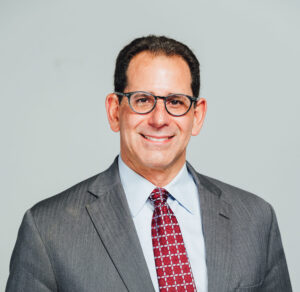 I am the founder and CEO of Activate Group Inc., a bestselling author, and serial entrepreneur specializing in liberating C-Suite teams from the barriers holding them back personally and professionally.
I am the founder and CEO of Activate Group Inc., a bestselling author, and serial entrepreneur specializing in liberating C-Suite teams from the barriers holding them back personally and professionally.
After owning and selling several of my own companies, working with numerous top Fortune 500 companies, and training with performance-enhancing organizations like Scaling Up and Gazelles, I have become a sought-after business mentor, executive coach, and keynote speaker.
My clients work in family-owned, multi-national, public, and private companies ranging from $1 million to over $1 billion in annual revenue. My expert keynote speeches cover employee empowerment, cash flow enhancement, human capital management, entrepreneurial freedom, and business growth.
With a 30-year track record of success, I guarantee any organization that my methods and systems can help them become more profitable, stable, and scalable.
